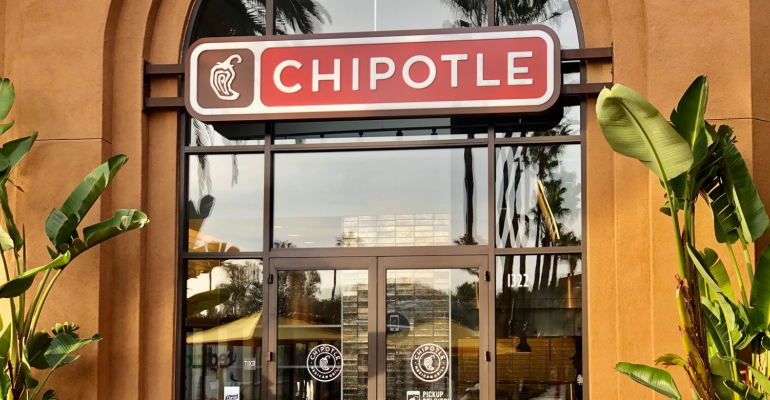Shareholders of Chipotle Mexican Grill will be asked to vote on two proposals that call for more transparency on the chain’s efforts to address diversity, equity and inclusion.
One, known as Proposal 6, calls for a third-party racial-equity audit to analyze how the 3,000-unit fast-casual chain is addressing civil rights issues and their impact on the business.
A second, known as Proposal 7, calls for the chain to publish qualitative data on workforce composition, retention and promotion rates of employees by gender, race and ethnicity.
The proposals, which are among the issues scheduled for a vote at Chipotle’s annual shareholder meeting May 18, are the latest example of shareholder groups pressuring publicly traded companies on environmental, social and governance, or ESG, goals.
McDonald’s shareholders, for example, are also scheduled to vote on proposal for a third-party civil rights audit at its shareholder meeting May 26, as well as proposals tied to animal welfare pushed by activist investor Carl Icahn. Environmental activist group As You Sow also has a filed resolution urging McDonald’s to report on how it will reduce use of single-use plastics.
Regarding Chipotle, shareholder Proposal 6 was filed with the Securities and Exchange Commission by New York State Common Retirement Fund, which owns 32,174 shares of common stock.
The proposal argues that Chipotle has made commitments to address some racial-equity issues, but “investors are left in the dark regarding the effectiveness of those commitments.”
The Newport Beach, Calif.-based chain, for example, participates in a program called Management Leadership for Tomorrow, or MLT, a national nonprofit designed to bridge the racial wealth gap and cultivate diverse leadership.
But that’s not the same as a racial-equity audit, argues the supporters of Proposal 6. Other companies, including Amazon, BlackRock and Citi, also participate in the MLT program and also conduct racial-equity audits, the filing states.
The proposal also contends Chipotle faces a number of reported workforce-related controversies, which raise questions about the company’s strategy. The chain was cited in New York City in 2019 for violating the Fair Workweek Law, for example, and in 2021 faced charges related to violating paid sick leave laws. The chain is battling class-action lawsuits over unpaid overtime claims and other wage-and-hour issues, according to the filing.
“In June 2020, Chipotle expressed public support for racial equity, while committing to do its ‘part to create an equal society,’” said a supporting statement for Proposal 6.
“Chipotle has also taken measures to address racial equity, including committing financial resources to support organizations advocating against systematic racism and publishing data on diversity, equity and inclusion,” the statement continued. But, it added, “There is no evidence that Chipotle is assessing the potential or actual negative impacts of its policies, practices, products and services from a racial equity lens.”
According to Chipotle’s latest Sustainability Report, issued last week, 70% of Chipotle’s U.S. employee base is comprised of racial and ethnic minorities, as of the end of 2021, and 53% were female.
In response, Chipotle’s board urged shareholders to vote against the third-party racial equity audit — not because the board is opposed to the idea, but because it would distract from a rigorous racial-equity program already underway.
The company said participation in the MLT program already requires a thorough audit. Companies have to identify equity gaps and develop a three-year plan to earn Black Equity at Work Certification, which is currently in process, the company said.
The plans submitted to MLT are assessed by independent reviewers, and, once plans are approved, the MLT conducts regular check-ins on progress.
Chipotle expects to be certified under the Black Equity program by 2023.
And Chipotle has signed up to become a launch employer under the MLT’s Hispanic Equity at Work Certification program, which is scheduled to begin in mid-2022.
“Although we are not opposed to conducting a racial equity audit in the future, undertaking the type of racial equity audit specifically requested by the proposal at the same time as we continue our intensive work to achieve Black Equity at Work Certification would divert key resources from our human capital and DE&I initiatives, and possibly even impede our ability to complete either project successfully,” Chipotle’s board said in a statement included in SEC proxy materials.
Chipotle’s board also urged a vote against Proposal 7, which seeks quantitative data that supporters argue would allow investors to compare the effectiveness of Chipotle’s diversity programs with its peers.
In its opposition statement, Chipotle said it already complies with the proposal and provides even more information than requested. A company report on diversity statistics indicates race and gender breakdown by position, looking at 2019 through 2021.
In 2021, for example, 23% of hourly workers were Hispanic women and 12% were Black or African American women. Among above-restaurant leadership, however, 12% were Hispanic women and 1% were Black women.
Men were more likely to move into leadership positions, with Hispanic men holding 22% of those roles, and white men holding 33%, though the gender mix was becoming more balanced over the three years included in the data.
At the end of 2021, Chipotle said 49% of restaurant leaders were women and more than 64% were racial or ethnic minorities.
Contact Lisa Jennings at [email protected]
Follow her on Twitter: @livetodineout





